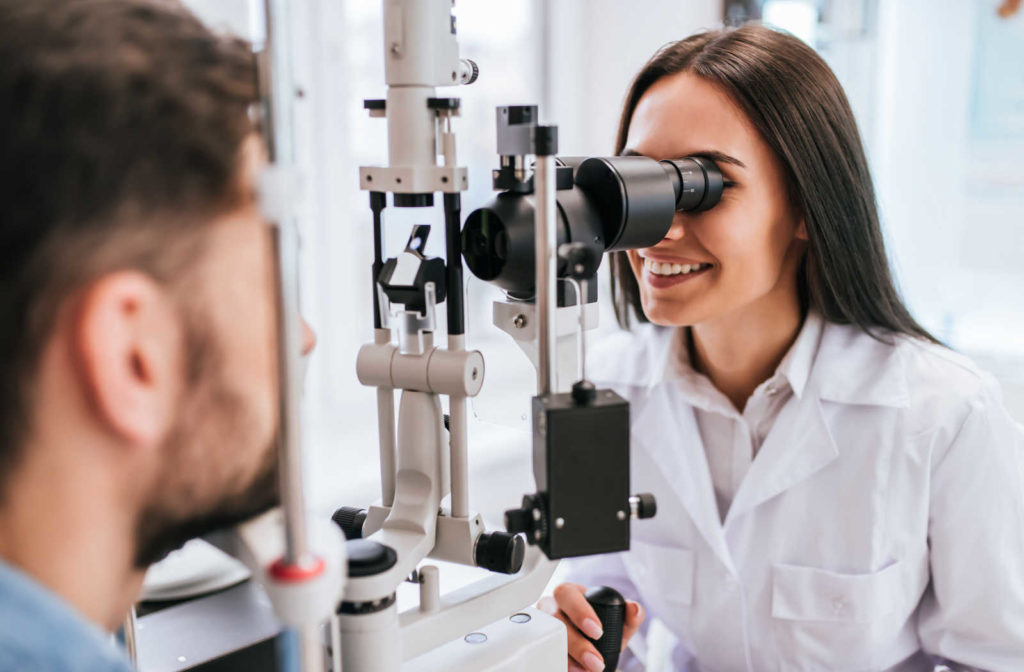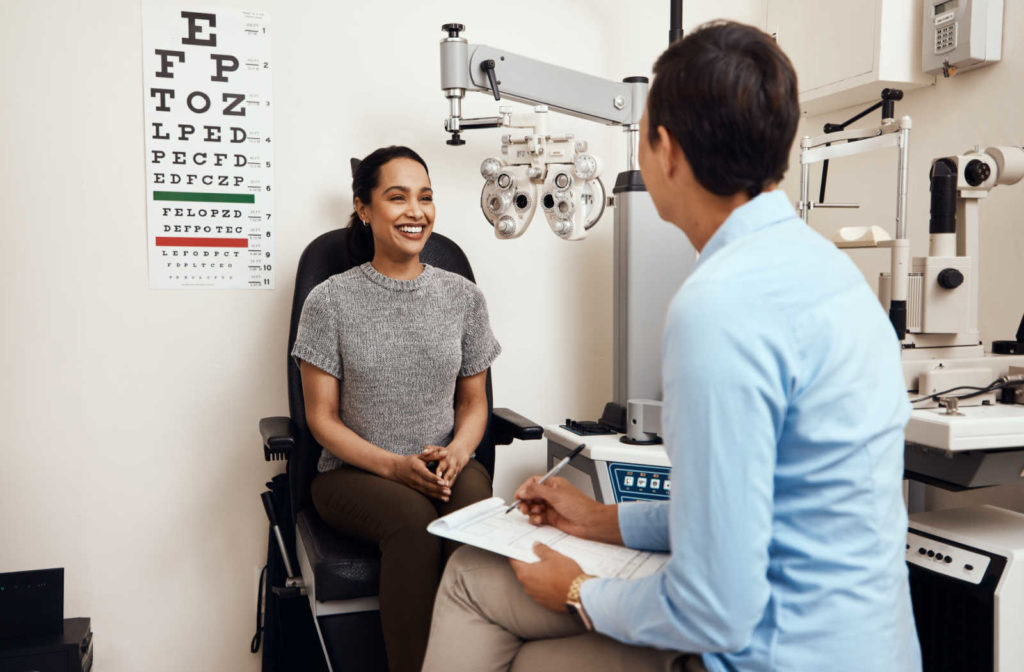Besides assessing how well you see, eye exams are essential for your eye health. They help your eye doctor identify problems, determine whether you need glasses, and screen for eye diseases.
There are several things to know about eye exams, including what they can detect, how often you need an exam, and what to expect during your appointment.
What Can Eye Exams Help Detect?
Your eye exam isn’t just a vision test; they help your eye doctor get a complete picture of your eye health and vision. Everyone needs eye exams—they’re vital for protecting your sight.
The diagnostic tests your eye doctor performs help identify problems as early as possible. Common eye conditions eye exams can help diagnose include:
- Strabismus
- Refractive errors like myopia, hyperopia, or astigmatism
- Presbyopia
- Glaucoma
- Age-related macular degeneration
- Cataracts
- Dry eyes
- Diabetic eye disease
Eye Exam Frequency
According to the Canadian Association of Optometrists, adults 20 to 39 should have an eye exam every 2–3 years. Adults 40 to 64 should have an eye exam at least every 2 years. Older adults past 65 should have an annual eye exam to track potential visual changes.
Age isn’t the only factor that plays into eye exam frequency—you also need regular eye exams if you’re at risk of an eye condition possibly due to your family history. In this case you may require more frequent follow-up to monitor any eye problems. Patients with diabetes or a high risk of eye disease should have an annual eye exam.
Your eye doctor can recommend the best schedule for your eye exams based on your unique needs.
What to Expect During Your Eye Exam
You can expect a few different tests during your eye exam. Your eye doctor completes these tests to assess your eye health and vision. Some of the tests in your eye exam may include visual acuity, intraocular pressure, retinal imaging, and more.
Visual Acuity & Refraction
Visual acuity refers to how clearly you can see. Your eye doctor tests this by having you read from an eye chart.
Another essential test related to your vision is refraction, which involves looking through different lenses to determine what lens power you need to correct a refractive error.
Eye Coordination
Your eyes need more than clear vision to see well. They must move and focus together, working as a team to see. Your optometrist tests for vision problems by assessing your eye coordination.
Testing skills like binocular vision help examine how well your eyes work together with your brain.
Intraocular Pressure Measurement
Intraocular pressure (IOP) is the fluid pressure inside your eye. Your eye doctor measures this to determine your risk of glaucoma, a common eye disease. Many forms of glaucoma occur due to high IOP.
Your optometrist measures IOP with an “air puff” test known as non-contact tonometry. This diagnostic test uses a puff of air on the eye to flatten the cornea and measure its resistance.
Retinal Imaging
Retinal imaging is a way to view the macula, retina, optic nerve, and other areas of the eye in detail. Your eye doctor scans the eye to create a photo of the eye’s internal structures, helping identify eye problems as early as possible.
OCT Eye Examination
Many eye conditions can develop with limited symptoms—scheduling regular eye exams is essential for identifying issues as early as possible. The sooner your optometrist diagnoses a problem, the faster they can provide treatment.
Optical coherence tomography (OCT) is a noninvasive imaging test used to examine the internal structures of your eye. Your optometrist takes a detailed image of the retina that can help diagnose eye diseases in their earlier stages. This test is beneficial for identifying problems that don’t present symptoms until their later stages.
Eye diseases OCT can help diagnose include:
- Glaucoma: Glaucoma is a group of eye diseases that damage your optic nerve, leading to severe vision loss. Most, but not all, cases of glaucoma happen due to increased eye pressure, which damages the optic nerve with time. Many people don’t experience symptoms of glaucoma until vision loss occurs.
- Age-related macular degeneration: Age-related macular degeneration (AMD) occurs when the macula thins with time, causing central vision loss. The early stages of this disease have no visible symptoms, making eye exams important to diagnose AMD as early as possible.
- Diabetic retinopathy: Diabetic retinopathy occurs when blood vessels in the eye swell and leak fluid and blood. The early stages of diabetic retinopathy have no symptoms, and early treatment is necessary to protect your vision.

Tips to Improve Your Eye Health
Eye care is more than a regular visit to your eye doctor. Your eye health begins at home, whether protecting your eyes from the sun or eating a healthy diet.
You can improve and protect your eye health in several ways.
Follow the 4 Ps
Following the 4 Ps can help you care for your eyes:
- Prevent: Living healthy is important for your eye health—invest in a good diet, watch your blood sugar, and avoid excessive drinking and smoking.
- Protect: Protecting your eyes involves avoiding unnecessary damage to your vision, such as wearing protective eyewear and using digital screens effectively.
- Preserve: You can preserve your vision by having regular eye exams. Your eye doctor can recommend the best ways to protect your sight.
- Prioritize: Prioritize your eye health and vision. You may assume that your eyes are fine if you have clear vision, but your eye health is complex. Your optometrist can uncover signs of issues beneath the surface.
Eat a Healthy Diet
Your diet significantly affects your health, including your eyes. Eating the right foods can help protect against eye disease and improve your overall health.
Some eye-friendly foods to add to your diet include:
- Fish
- Seeds
- Citrus fruits
- Nuts
- Eggs
- Sweet potatoes
- Carrots
- Leafy green vegetables
Book Regular Eye Exams
The best thing you can do for your vision is to book frequent eye exams. These exams are essential for your eye health, helping assess and protect your vision.
Book Your Next Eye Exam with Us
Don’t leave your sight up to chance—eye exams are one of the best ways to care for your vision and health. Your optometrist is here to help assess your vision and treat eye problems. Contact LMC Optometry & Eye Care when it’s time for your next eye exam.



